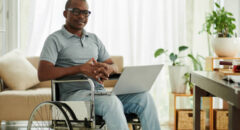
Michelle Levert has spent most of her life on her feet—working retail full-time and caring for her aging parents. But when debilitating knee pain made even basic movement difficult, everything started to suffer.
Her experience reflects a growing caregiving crisis. More than 10 million family caregivers report being in fair or poor health, and another 13 million put off their own medical care to support others. Black American caregivers face even greater demands—many live with the person they care for and devote an average of 20.6 hours each week to caregiving.
The Toll of Caregiving and Pain
Levert’s knee issues escalated quickly, moving from manageable discomfort to being “bone on bone,” necessitating a double knee replacement. The pain was amplified by her demanding schedule: managing her retail job, performing daily tasks, and providing full-time care for her 91-year-old parents.
“My knees just got progressively worse, and I went from needing no kind of aid to walking with a cane,” she tells BlackDoctor.
She recalls the moment she collided with her dad, who is also on a walker full-time, which caused her to hit rock bottom.
“I was coming out of my room with the walker, he was coming down the hallway. I’m in route to the office and we met together,” Levert shares.
At the time, the two laughed it off, her dad making a joke about a traffic jam, but Levert quickly realized she was dealing with a serious injury.
The pain eventually confined her to a wheelchair inside the house, even for simple tasks like getting to the bathroom in the middle of the night.
“It really struck me in my gut that. I can’t live like this. I’m here and I have to take care of my parents. They’re amazing parents. They’ve taken care of me,” Levert recalls thinking.
For Levert, the moment was emotional.
“I did cry, not in his sight, but I did cry because I’m like, this is not the way that I should be living, and I need to get myself together so that I’m able to care for my parents in the way that they deserve,” she adds.
RELATED: 5 Life Changing Self-Care Tips For Caregivers
The Courage to Change: Embracing the “New Michelle”
The decision to undergo knee replacement surgery was fraught with fear—concerns about leaving work, who would care for her parents, and the sheer emotional and physical recovery ahead. Levert knew she had to shift her mindset.
Finding the Right Partnership
A key part of her success was finding the right surgeon. “It definitely took some time for me to decide,” she shares.
Eventually, she landed on a doctor who shared her vision for a long-term, successful outcome. However, he didn’t make it easy. He challenged Levert to lose nearly 40 pounds before the operation, recognizing that increased mobility pre-surgery would lead to better results post-surgery. With determination and support from her care team, she made it happen.
Levert, who is partnering with Zimmer Biomet, utilized their smart knee technology and the mymobility app, which became a vital component of her physical and mental recovery from receiving a Persona IQ knee.
The app provided education, tracked exercises, and kept her honest and motivated.
“I really enjoyed the app,” she notes. The app on my phone kept me educated, kept me knowing what was coming up for me. The education was great…”
While the physical part was tough, the emotional toll was significant, and the technological support helped her navigate the entire journey, especially during recovery.
Levert recalls her surgeon saying, “I’m going to get you a new knee. The results of that knee is completely on me [Michelle],” which motivated her to do the hard work of recovery.
“There were times I was in pain and just didn’t want to do it, but I always thought back to my parents…There’s a bigger picture. I’m the small picture in the bigger picture and I think with that mindset that was how I was able to get up and do the things that I needed to do, and you know, having family absolutely helps me. But it definitely is a mindset. And I proved something to myself, which is amazing, that I can take a challenge on and complete it and be better for it,” Levert adds.

The Shift to Sustainable Self-Care
For Levert, a Black woman and caregiver, the cultural tendency to “put others first” often resulted in self-neglect and emotional burnout. She recognizes that in her community, people often “give your last dollar, your last breath… and a lot of time, we get left behind.”
RELATED: How to Manage Aging Parents Who Can’t Live Alone: A Guide For Caregivers
Now, she operates from a healthier standpoint and a reformed mindset.
- Setting Boundaries: Levert has had to learn to say no and set limits, realizing that anything that negatively affects her, in turn, negatively affects the care she provides.
- Drawing Strength: Her faith and the unconditional love for her parents became her motivation. She didn’t want them to lose confidence in her or feel the need to stop asking her for help. The thought of them was the “extra energy” she needed to complete her recovery walks and exercises.
- A Positive Outlook: “The old Michelle doesn’t work anymore,” she states. She has transformed challenges into opportunities, choosing a more optimistic, positive perspective and refusing to live in a space of sadness and emotional depletion.
“Caregiving is emotional,” she says. “I’m a believer, so I’ve prayed to God a lot to give me the strength to move on,” Levert shares.
View this post on Instagram
The Future: Reclaiming Independence
After experiencing the “before and after” with the Persona IQ knee, she’s already planning to have her other knee (Left knee replacement) done.
“This experience for me has changed me immensely. I was definitely so much more optimistic, so much more positive, because I had seen the other side and what that looked like and what that sadness and those emotions did to me. And I really can’t live in that space. I have two 91-year-old people who are depending on me,” Levert notes.
She’s moving through life again—with purpose.
Levert is currently planning her first vacation in years—a cruise next year—which she is anticipating with excitement, not dread. Though she still faces the challenge of losing weight for her left knee replacement, her new mindset empowers her to take it “day-by-day.”

Her ultimate takeaway for other struggling caregivers: Ask for help.
“I did ask a lot of friends and family, and even customers in my sports space who had knee replacements,” she notes.
Levert’s journey underscores that finding the right doctor is key. For those seeking a specialist who shares their vision for success, the Zimmer Biomet Find a Doctor tool is a valuable resource for starting your research and connecting with surgeons experienced in advanced knee replacement options like The Persona Knee.
Don’t be afraid to research, ask friends and family for recommendations, and interview several doctors until you find the perfect fit.








